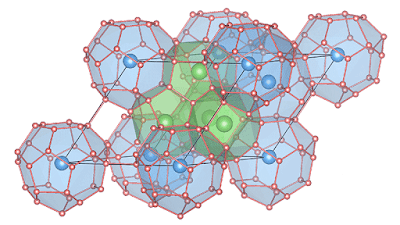 |
| Under pressure: calculated structure of lithium magnesium hydride. Lithium atoms appear in green, magnesium in blue and hydrogen in red. (Courtesy: Ying Sun et al/Phys. Rev. Lett.) |
Topics: Chemistry, Materials Science, Nanotechnology, Superconductors
A material that remains a superconductor when heated to the boiling point of water has been predicted by physicists in China. Hanyu Liu, Yanming Ma and colleagues at Jilin University have calculated that lithium magnesium hydride will superconduct at temperatures as high as 473 K (200 °C).
The catch is that the hydrogen-rich material must be crushed at 250 GPa, which is on par with pressures at the center of the Earth. While such a pressure could be achieved in the lab, it would be very difficult to perform an experiment to verify the prediction. The team’s research could, however, lead to the discovery of more practical high-temperature superconductors.
Superconductors are materials that, when cooled below a critical temperature, will conduct electricity with zero resistance. Most superconductors need to be chilled to very low temperatures, so the holy grail of superconductivity research is to find a substance that will superconduct at room temperature. This would result in lossless electricity transmission and boost technologies that rely on the generation or detection of magnetic fields.
Superconductivity at the boiling temperature of water is possible, say physicists
Hamish Johnston, Physics World
Comments